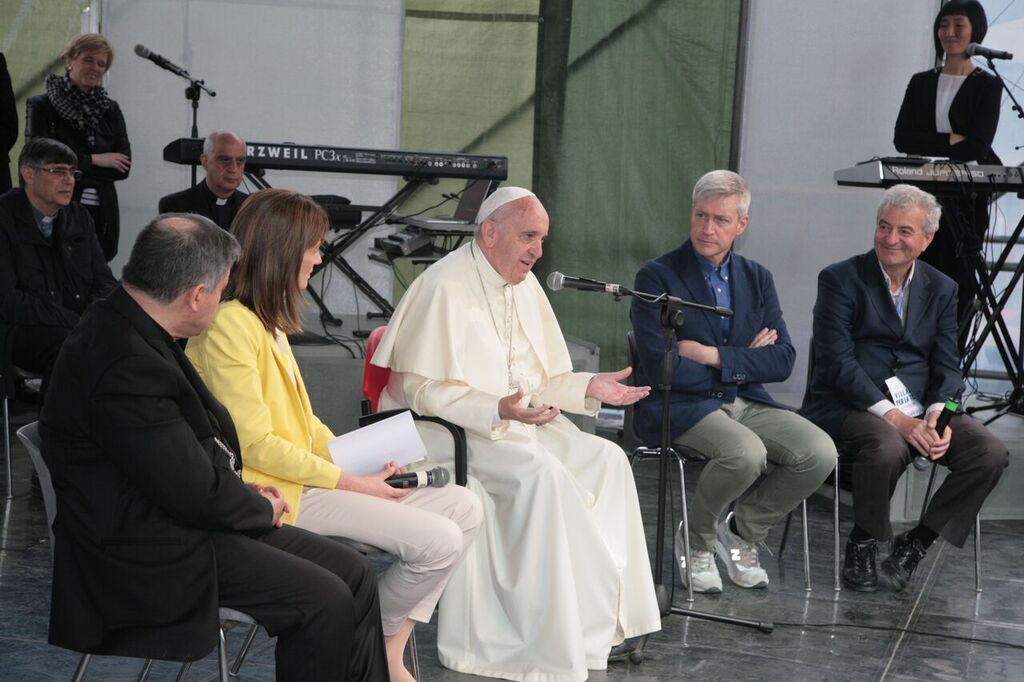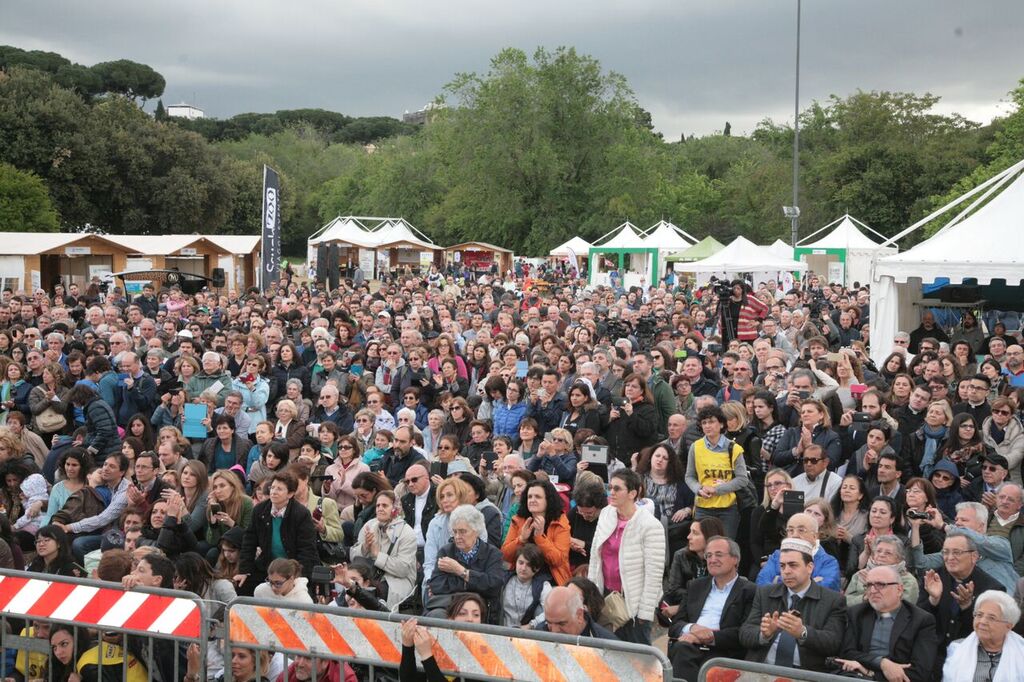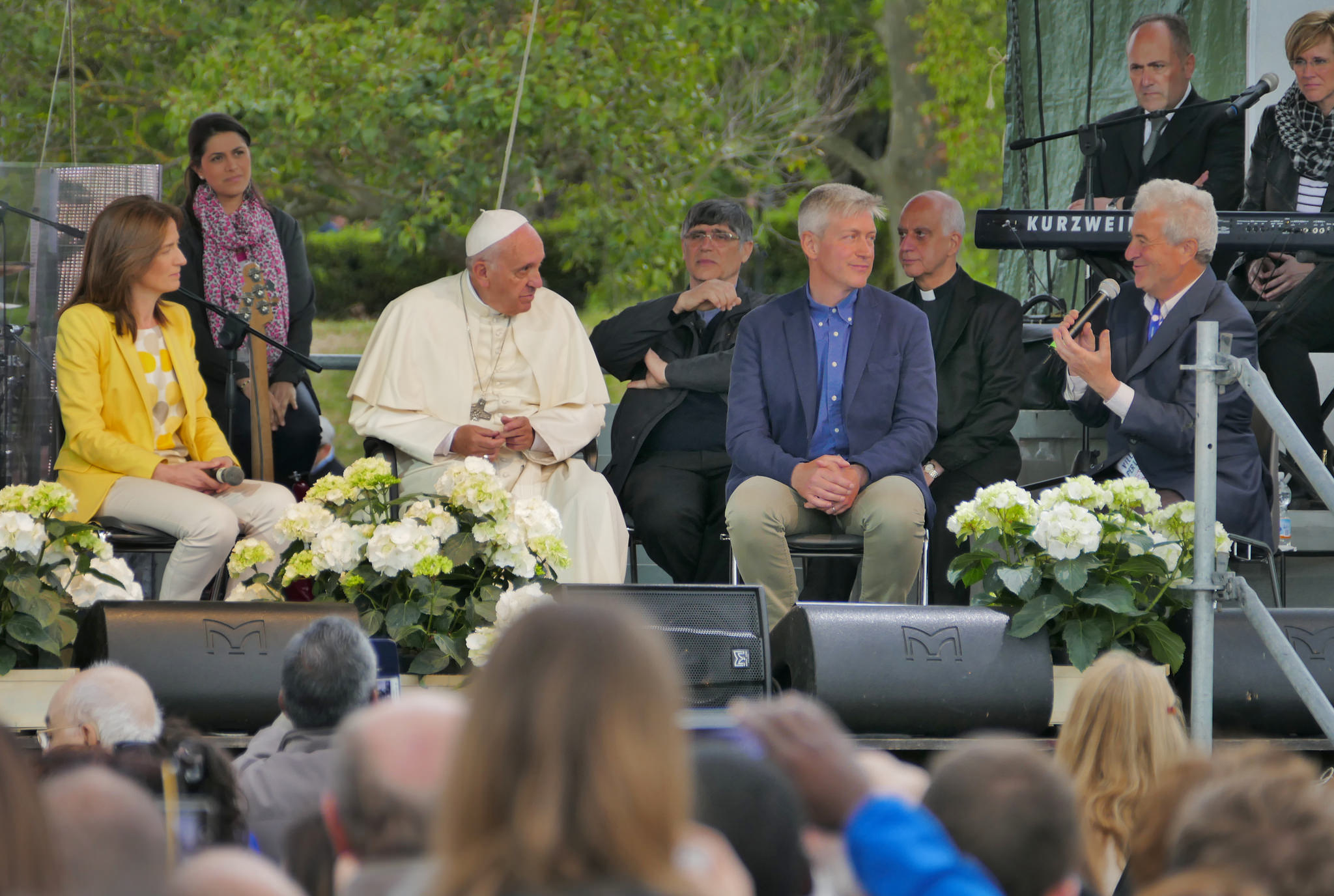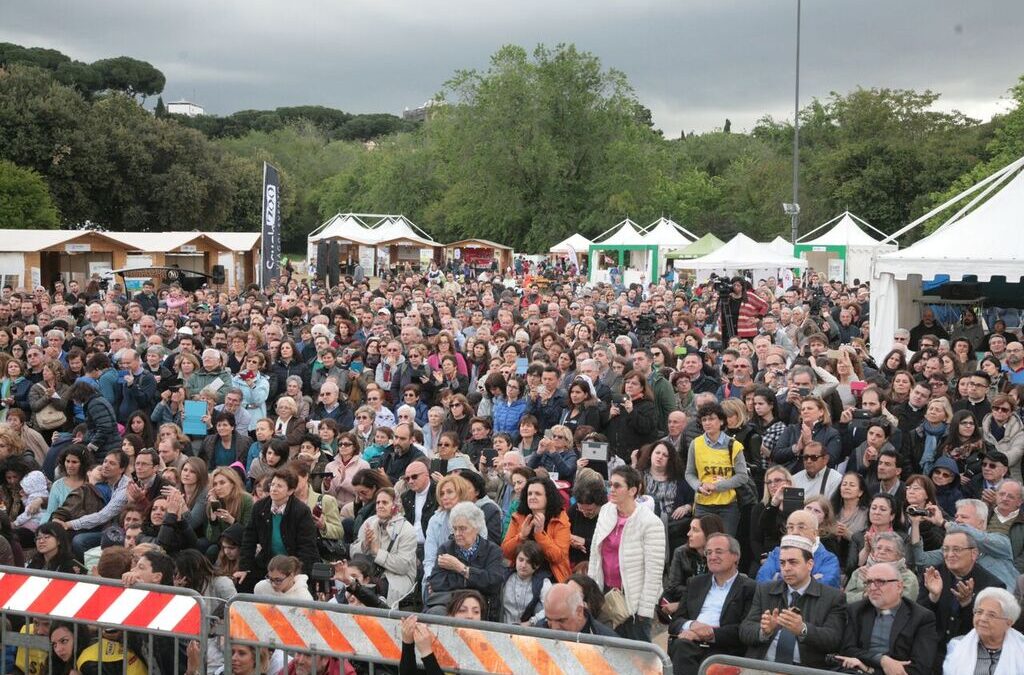

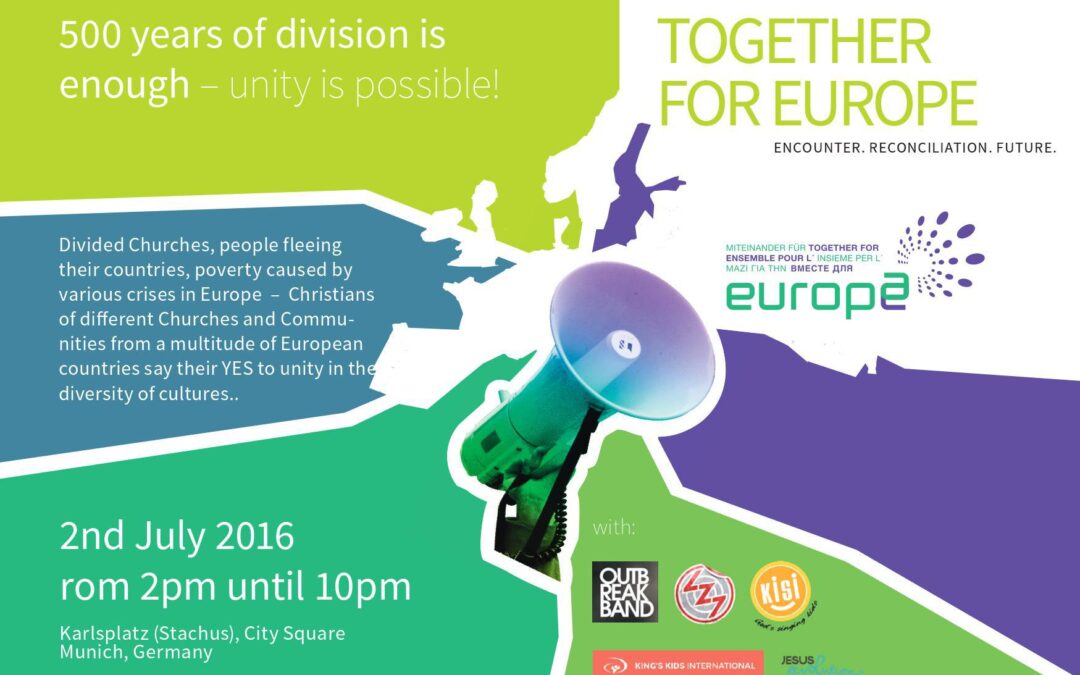
Europe on the move
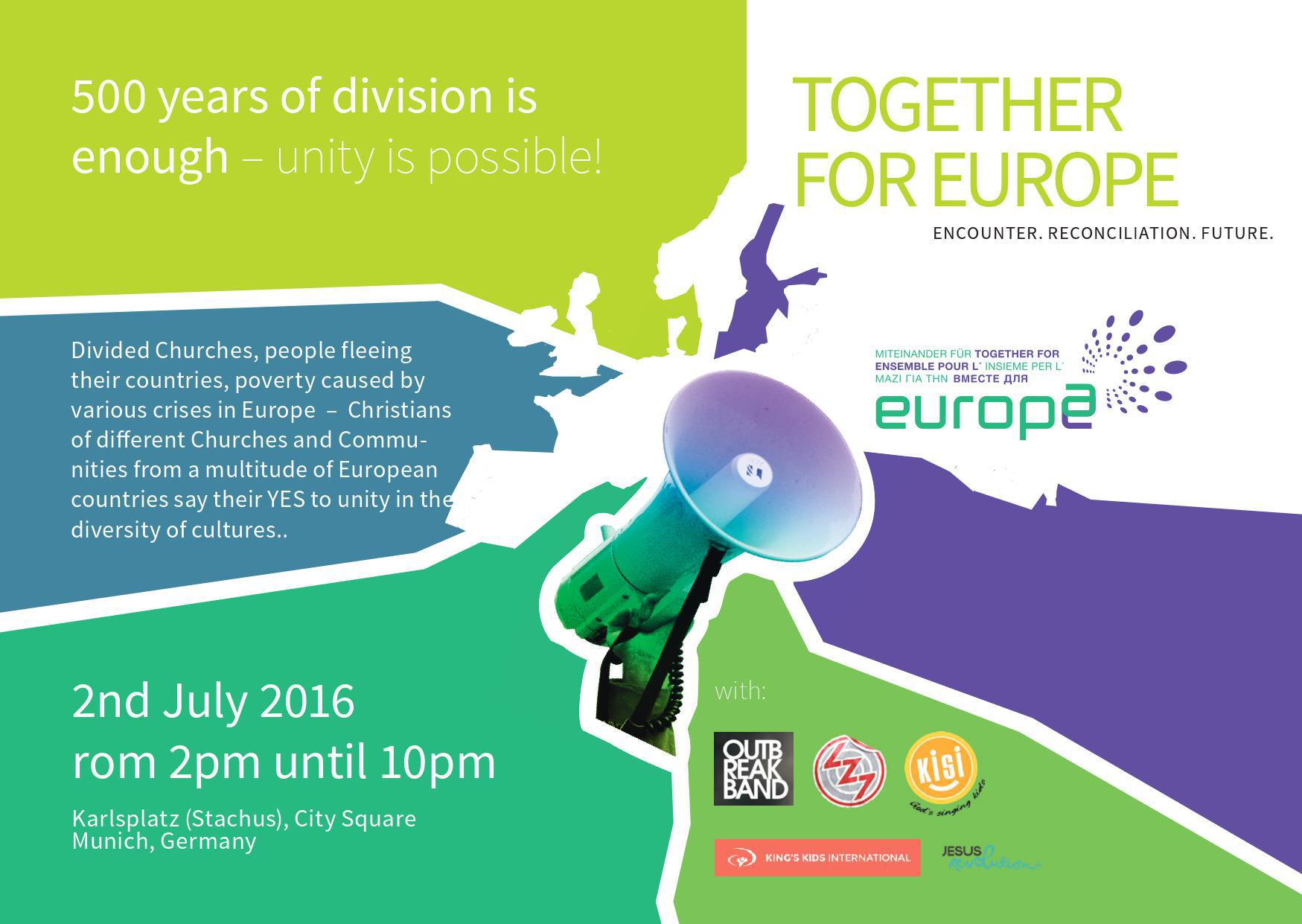 Encounter, Reconciliation, and Future, are three words that encompass the significance of the meeting in Munich at the Karlsplatz (Stachus),which was promoted by over 300 movements and communities of different Christian Churches. The objective is: to reflect together on the challenges that Europe faces, in the light of the testimonials of the network which is hidden at times, but very active and representing that part of society which commits itself to hospitality and solidarity for the most disadvantaged and weaker sections of society, so as to bridge the east and west, and overcome open or underlying conflicts. “What message does Europe have to give to the world?” When posed this question, the reply of the Focolare President, Maria Voce, concerned the objectives of the IPE: “The experience of these 2,000 years of Christianity brought about the maturation of ideas, culture, life, and actions that are necessary in the world today, and which unfortunately have not been evidenced. This is also because what is highlighted in Europe nowadays, are the difficulties, dramas, walls, and intolerance. Therefore, the good that exists is not manifested.“In the Evangelii Gaudium, Pope Francis speaks of the ‘invisible cities’ and the “connective network in which people share a common imagination, dreams about life, new human interactions that arise, and new cultures” (EG 74). «But right after this– Jesús Morán, Focolare Co-President explains – the Pope says that these invisible cities and territorial subcultures create a sort of ambivalence, and that subcultures practice segregation, violence and criminal activities. And so through fraternity inspired by love» which is the core of the message of the IPE, “We would like to show that in the good reigns in the invisible cities, and where there are virtuous practices, refugees are welcomed, and communion exists.” What are thus the expectations for this edition of the European meeting which is precisely on the eve of the 500th-year anniversary of the Reform, in a particular conjunction which sees the continent in a progressive crisis, also because of its incapacity to respond to the crisis of the migrants? We discussed it with Ilona Toth – from Hungary – and Diego Goller – an Italian, who on behalf of the Focolare Movement personally took part in the preparation for the Together for Europe event. «Recently the Orientation Committee of IEP met at the Roman headquarters of the Sant’Egidio Community, where the various movements leading this pathway converge. It was an opportunity to have another confrontation and trace an outline of our ideas. A year before the 500th anniversary of Luther’s Reform (1517-2017), we would like to show that a network of united Christians already exists, and is working among various movements and Churches», Diego Goller said. «We try to move ahead of the times and to show that in this Togetherness there is unity reached, not institutionally or theologically, but in its essence and substantial reconcilement: “500 years of division ” is, in fact, the title of one of the moments of the meeting. We are also guided by what Pope Francis and Patriarch Kirilli said in their joint declaration that the Christians of Eastern and Western Europe should unite to testify to the Gospel together.» «This is political action in the most noble sense of the term,» Ilona Toth affirmed. «The aim is to show all the good there is. Together for Europe’s prophecy lies in its name. Together is the gift of fraternity among us Christians, and on a broader range, with people of other religions and cultures. Then there comes the political side where Togetherness is achieved: charisms give concrete responses also to the political issues of cities.» And she concluded: «In Munich, we would like to show this stream of goodness which is already being put into action, and is also the fruit of the values of Christianity, developed throughout the centuries and brought to light today by the various charisms.» The event of 2 July will be preceded by a Congress of the Movements (30 June/1 July) at the Circus-Krone-Bau: 17 Forums and 19 Round Tables will involve exponents of the Churches, politics and civil society, who will discuss current issues. As a preparation for the Munich event, last 21 April in Genève at the Ecumenical Council of Churches, a round table was held, entitled “What are the identity and values of Europe?” Consult www.together4europe.org for further information. https://youtu.be/0CyLm0Nrkko Maria Chiara De Lorenzo
Encounter, Reconciliation, and Future, are three words that encompass the significance of the meeting in Munich at the Karlsplatz (Stachus),which was promoted by over 300 movements and communities of different Christian Churches. The objective is: to reflect together on the challenges that Europe faces, in the light of the testimonials of the network which is hidden at times, but very active and representing that part of society which commits itself to hospitality and solidarity for the most disadvantaged and weaker sections of society, so as to bridge the east and west, and overcome open or underlying conflicts. “What message does Europe have to give to the world?” When posed this question, the reply of the Focolare President, Maria Voce, concerned the objectives of the IPE: “The experience of these 2,000 years of Christianity brought about the maturation of ideas, culture, life, and actions that are necessary in the world today, and which unfortunately have not been evidenced. This is also because what is highlighted in Europe nowadays, are the difficulties, dramas, walls, and intolerance. Therefore, the good that exists is not manifested.“In the Evangelii Gaudium, Pope Francis speaks of the ‘invisible cities’ and the “connective network in which people share a common imagination, dreams about life, new human interactions that arise, and new cultures” (EG 74). «But right after this– Jesús Morán, Focolare Co-President explains – the Pope says that these invisible cities and territorial subcultures create a sort of ambivalence, and that subcultures practice segregation, violence and criminal activities. And so through fraternity inspired by love» which is the core of the message of the IPE, “We would like to show that in the good reigns in the invisible cities, and where there are virtuous practices, refugees are welcomed, and communion exists.” What are thus the expectations for this edition of the European meeting which is precisely on the eve of the 500th-year anniversary of the Reform, in a particular conjunction which sees the continent in a progressive crisis, also because of its incapacity to respond to the crisis of the migrants? We discussed it with Ilona Toth – from Hungary – and Diego Goller – an Italian, who on behalf of the Focolare Movement personally took part in the preparation for the Together for Europe event. «Recently the Orientation Committee of IEP met at the Roman headquarters of the Sant’Egidio Community, where the various movements leading this pathway converge. It was an opportunity to have another confrontation and trace an outline of our ideas. A year before the 500th anniversary of Luther’s Reform (1517-2017), we would like to show that a network of united Christians already exists, and is working among various movements and Churches», Diego Goller said. «We try to move ahead of the times and to show that in this Togetherness there is unity reached, not institutionally or theologically, but in its essence and substantial reconcilement: “500 years of division ” is, in fact, the title of one of the moments of the meeting. We are also guided by what Pope Francis and Patriarch Kirilli said in their joint declaration that the Christians of Eastern and Western Europe should unite to testify to the Gospel together.» «This is political action in the most noble sense of the term,» Ilona Toth affirmed. «The aim is to show all the good there is. Together for Europe’s prophecy lies in its name. Together is the gift of fraternity among us Christians, and on a broader range, with people of other religions and cultures. Then there comes the political side where Togetherness is achieved: charisms give concrete responses also to the political issues of cities.» And she concluded: «In Munich, we would like to show this stream of goodness which is already being put into action, and is also the fruit of the values of Christianity, developed throughout the centuries and brought to light today by the various charisms.» The event of 2 July will be preceded by a Congress of the Movements (30 June/1 July) at the Circus-Krone-Bau: 17 Forums and 19 Round Tables will involve exponents of the Churches, politics and civil society, who will discuss current issues. As a preparation for the Munich event, last 21 April in Genève at the Ecumenical Council of Churches, a round table was held, entitled “What are the identity and values of Europe?” Consult www.together4europe.org for further information. https://youtu.be/0CyLm0Nrkko Maria Chiara De Lorenzo
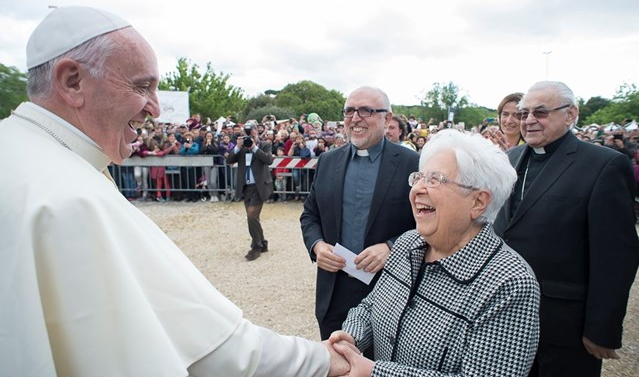
Pope Francis at the Mariapolis
 “It was the first time a Pope came to the Mariapolis and it reminded me of what I had heard Chiara Lubich say several times when describing the effect that the visits and the words of bishops had on her when they visited Mariapolises. She acknowledged them as “an anointing” different and weightier than those of others, whether they were theologians or saints. And she perceived that with the presence of a bishop the ‘city of Mary’ fulfils itself as the ‘city-Church’. This is what happened with the surprise visit of Pope Francis to the Earth Village event at Villa Borghese where, in collaboration with Earth Day Italy, the city of Rome was holding its Mariapolis. Now every Mariapolis in the world – and there are hundreds – will feel looked upon and loved in the same way. His off the cuff remarks seemed to say: you’ve taken me by the heart and I want to respond to what you’ve said to me. His clear and luminous words weren’t only an acknowledgement of the commitment and the deeds of the many people who spoke to him on stage; they also had the flavour of a programme for the future. His words kept returning to the same powerful image of the miracle of being able to transform the desert into forestland. I was struck by the way he acknowledged that what matters is to bring life, not make programmes and remain trapped inside them, but to go out and meet life as you find it, with its disorder and conflicts, without fear, facing the risks and welcoming the opportunities. You have to get close to it if you want to know the reality with your heart. Then the miracles happen: deserts, the most diverse sorts of deserts transform into forestland. Pope Francis possesses the power of the word. The images he uses are not easily erased from the heart or the mind. The Pope repeated several times that we do it together, with different people, groups and associations. He holds us to that and it gives him joy. The human spectacle at Villa Borghese was born from a question: Why not hold the Mariapolis right in the middle of Rome? Why not try to create a graft of fraternity with the city, a small but concrete ‘fraternity graft’ right on the streets of the city? We know that the city weeps because of many wounds and suffers from many weaknesses, but she also lives because of an unbelievable richness: the great good that is being done in her. When the Pope opened the Year of Mercy we thought of the many associations that are doing good in the city. Both religious and non-religious, they perform mercy. The encounter with Earth Day was almost by chance. Earth Day Italy works for the protection of Creation and for that integral ecology that is dear to Francis. It’s a process and exciting work that’s outside the normal scheme, on unimagined roads. Not without its difficulties, certainly, because we didn’t know one another and because we’re all different. But diversity is enriching, as the encounter with more than a hundred associations was. There was cooperation and bridges were built. Sometimes they’re very small things. One new friend told us: “Well, my association goes forward with the help of my pension. We don’t have logos or anything like that.” We wanted the Mariapolis this year to give witness to the good that that friend is also doing. Thus, the many virtuous underground cities contained in Rome emerged. The good is multiplying and a network is spreading that seems to concur with an intuition that Chiara Lubich put into writing in 1949. Encountering and loving Rome ‘many eyes would be illumined with His Light: tangible sign that He reigns there (. . .) reviving Christians and making this age that is so cold because it is atheist the Age of Fire, the Age of God (. . .) He’s not only a religious fact (. . .) And this separating Him from the entire life of men – a practical heresy of our time – subjugates man to something less than himself and relegates God who is Father to somewhere far from His children.”
“It was the first time a Pope came to the Mariapolis and it reminded me of what I had heard Chiara Lubich say several times when describing the effect that the visits and the words of bishops had on her when they visited Mariapolises. She acknowledged them as “an anointing” different and weightier than those of others, whether they were theologians or saints. And she perceived that with the presence of a bishop the ‘city of Mary’ fulfils itself as the ‘city-Church’. This is what happened with the surprise visit of Pope Francis to the Earth Village event at Villa Borghese where, in collaboration with Earth Day Italy, the city of Rome was holding its Mariapolis. Now every Mariapolis in the world – and there are hundreds – will feel looked upon and loved in the same way. His off the cuff remarks seemed to say: you’ve taken me by the heart and I want to respond to what you’ve said to me. His clear and luminous words weren’t only an acknowledgement of the commitment and the deeds of the many people who spoke to him on stage; they also had the flavour of a programme for the future. His words kept returning to the same powerful image of the miracle of being able to transform the desert into forestland. I was struck by the way he acknowledged that what matters is to bring life, not make programmes and remain trapped inside them, but to go out and meet life as you find it, with its disorder and conflicts, without fear, facing the risks and welcoming the opportunities. You have to get close to it if you want to know the reality with your heart. Then the miracles happen: deserts, the most diverse sorts of deserts transform into forestland. Pope Francis possesses the power of the word. The images he uses are not easily erased from the heart or the mind. The Pope repeated several times that we do it together, with different people, groups and associations. He holds us to that and it gives him joy. The human spectacle at Villa Borghese was born from a question: Why not hold the Mariapolis right in the middle of Rome? Why not try to create a graft of fraternity with the city, a small but concrete ‘fraternity graft’ right on the streets of the city? We know that the city weeps because of many wounds and suffers from many weaknesses, but she also lives because of an unbelievable richness: the great good that is being done in her. When the Pope opened the Year of Mercy we thought of the many associations that are doing good in the city. Both religious and non-religious, they perform mercy. The encounter with Earth Day was almost by chance. Earth Day Italy works for the protection of Creation and for that integral ecology that is dear to Francis. It’s a process and exciting work that’s outside the normal scheme, on unimagined roads. Not without its difficulties, certainly, because we didn’t know one another and because we’re all different. But diversity is enriching, as the encounter with more than a hundred associations was. There was cooperation and bridges were built. Sometimes they’re very small things. One new friend told us: “Well, my association goes forward with the help of my pension. We don’t have logos or anything like that.” We wanted the Mariapolis this year to give witness to the good that that friend is also doing. Thus, the many virtuous underground cities contained in Rome emerged. The good is multiplying and a network is spreading that seems to concur with an intuition that Chiara Lubich put into writing in 1949. Encountering and loving Rome ‘many eyes would be illumined with His Light: tangible sign that He reigns there (. . .) reviving Christians and making this age that is so cold because it is atheist the Age of Fire, the Age of God (. . .) He’s not only a religious fact (. . .) And this separating Him from the entire life of men – a practical heresy of our time – subjugates man to something less than himself and relegates God who is Father to somewhere far from His children.”
Maria Voce
President of the Focolare Movement
Source (Italian): Osservatore Romano, 25 aprile 2016 Centro televisivo vaticano (Italian)
Press releases – SIF – Focolare Information Service
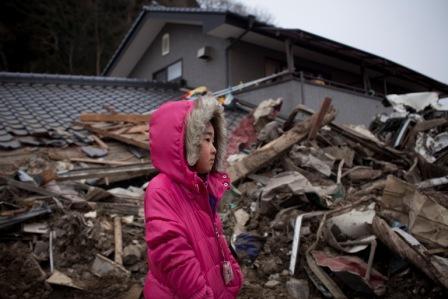
Giving hope in Ecuador and Japan
Isabel shares her state of mind following the earthquake that hit her country, Ecuador, on April 16. The physical structures that fell – bridges, buildings, houses – invite us to feel the earthquake in our own souls as well, and to ask ourselves whether we really are peace builders? I’ve realised that suffering helps to unite us. I’d like to challenge everyone during in these difficult days, to convert and become bearers of hope and optimism, that we help one another to keep faith alive.” There are 587 confirmed dead, and the wounded are more than 8 thousand, with 25 thousand displaced persons. The numbers continue to grow and it is estimated that reconstruction will cost the country billions of dollars. The Focolare Movement has begun a fundraiser for the Ecuador emergency, while they plan intervention on the ground.

Photo: United Nations
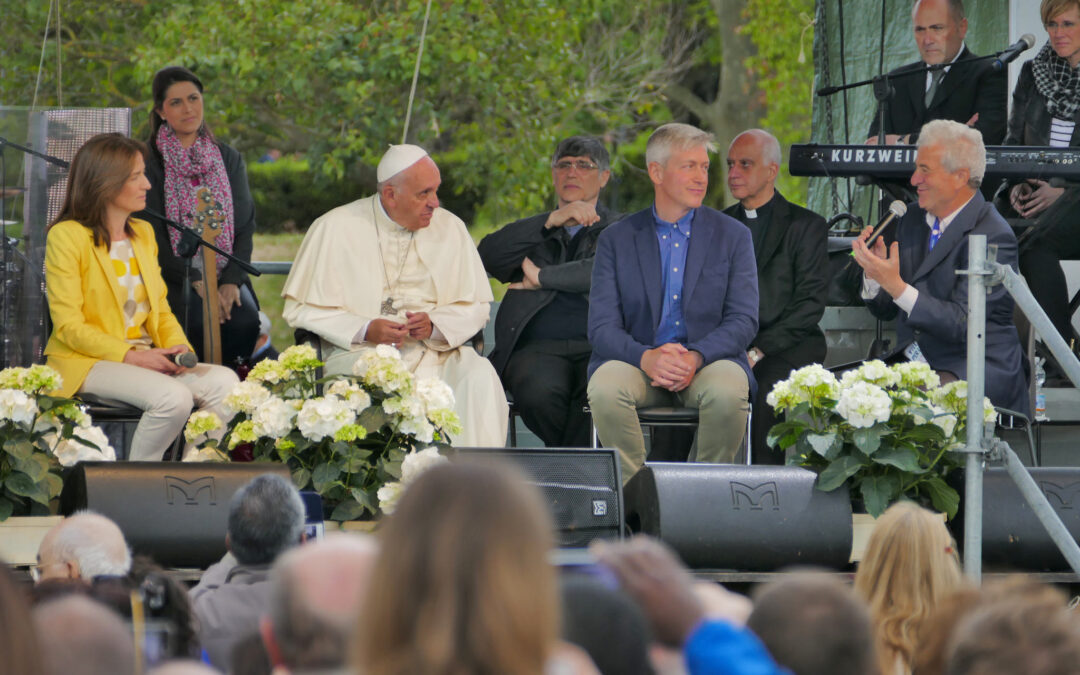
Pope Francis: You transform the deserts into living forests
“You transform the deserts into forests”, said Pope Francis putting aside his prepared speech for the occasion, arousing enthusiasm and emotion in the thousands of people who watched the Holy Father’s car driving into the “Earth Village” for a surprise visit on the afternoon of Sunday, April 24th. The event was organised by the Focolare Movement in the heart of Rome at the green centre of the capital: the Villa Borghese Racing Track. The Pope showed up unexpectedly and was warmly greeted by families, young people and people of all ages who have been taking part in the events being held at the “Village” focusing on themes of the Earth, Legality, Interreligious Dialogue and Solidarity. Donato Falmi and Antonia Testa who are responsible for the Focolare Movement in Rome, and Pierluigi Sassi, President of Earth Day Italy, welcomed the Holy Father on stage at the “Village” and described the spirit of the event. Falmi introduced the Pope into the experience of Mariapolis 2016, which is titled “Living together in the city”, with special emphasis on three main words that are often repeated by Francis and were chosen as the inspiration for the event: “mercy”, “tenderness” and “diversity as an enrichment.” Antonia Testa described the collaboration between the Focolare Movement and Earth Day Italy and explained how the Mariapolis wished to turn its gaze on the city of Rome, on its poverty – but especially on the “great good” that is quietly but incisively being carried out every day across the social fabric. Pierluigi Sassi then explained to Pope Francis how the path to this “Village” began from the proclamation of Laudato Si’ and by “March for the Earth” which Earth Day Italy had organised and engaged 130 organisations in view of the COP21 climate agreement. Pope Francis listened to the intense testimonies of several Mariapolis participants: some of them heart-wrenching experiences of solidarity in the criminal justice system and with immigrants; projects by young people promoting disarmament; legality and the campaign against gambling. Pierluigi concluded by stressing the significance of the football match which will be played on Monday at the “Village” between the Liberi Nantes – the football team entirely comprised by asylum seekers and political refugees – and the university students from the LUISS. “Don’t be afraid of conflict that contains within it both risk and opportunity,” Francis said. “Knowledge is a risk for me and for the person I draw near to. But never, never turn away so that you won’t have to see. Draw near to others, take their hand, go to dry their many tears… this is how a smile can be born in the desert.” “I’ll give you an assignment to do at home,” the Pope concluded. “When you go down the street, you see that tenderness is missing. Each person is enclosed in him and herself. Friendship is lacking. Money is at the centre of today’s world, but ‘gratuity’ is the keyword for this desert to become a forest. How do you do that? Always from within an awareness of our own need to be forgiven… working together, respecting each other – this is how the miracle happens in the desert that becomes a forest. Thank you for all that you do.” Before the final goodbye a young boy gave Francis the “Earth Cube”, an educational toy used for teaching children the principles for safeguarding Creation. https://vimeo.com/164030691 See Flickr photostream by Thomas Klann 
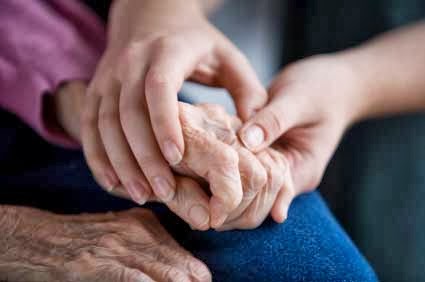
Chiara Lubich: “clothe ourselves in mercy”
 “We had said we wanted to see only Jesus in our neighbour, to deal with Jesus in our neighbor, to love Jesus in our neighbor, but now we recall that a neighbor has this or that defect, has this or that imperfection. Our eye becomes complicated and our being is no longer lit up. As a consequence, erring, we break unity. Perhaps that particular neighbor, like all of us, has made mistakes, but how does God view him or her? What really is that person’s condition, the truth of his or her state? If our neighbor is reconciled with God, then God no longer remembers anything, he has wiped out everything with his blood. So, why should we go on remembering? Who is in error at that moment? I who judge or my neighbour? I am. Therefore I must make myself see things from God’s viewpoint, in the truth, and treat my neighbor accordingly, so that if, by some mishap, he or she has not yet sorted things out with the Lord, the warmth of my love, which is Christ in me, will bring my neighbor to repentance, in the same way that the sun dries and heals over many wounds. Charity is preserved by truth, and truth is pure mercy with which we ought to be clothed from head to foot in order to be able to call ourselves Christians.”
“We had said we wanted to see only Jesus in our neighbour, to deal with Jesus in our neighbor, to love Jesus in our neighbor, but now we recall that a neighbor has this or that defect, has this or that imperfection. Our eye becomes complicated and our being is no longer lit up. As a consequence, erring, we break unity. Perhaps that particular neighbor, like all of us, has made mistakes, but how does God view him or her? What really is that person’s condition, the truth of his or her state? If our neighbor is reconciled with God, then God no longer remembers anything, he has wiped out everything with his blood. So, why should we go on remembering? Who is in error at that moment? I who judge or my neighbour? I am. Therefore I must make myself see things from God’s viewpoint, in the truth, and treat my neighbor accordingly, so that if, by some mishap, he or she has not yet sorted things out with the Lord, the warmth of my love, which is Christ in me, will bring my neighbor to repentance, in the same way that the sun dries and heals over many wounds. Charity is preserved by truth, and truth is pure mercy with which we ought to be clothed from head to foot in order to be able to call ourselves Christians.”
Source:Chiara Lubich, Essential Writings, New City Press, New York 2007, pp. 100-101
South Africa: The fruits of forgiveness
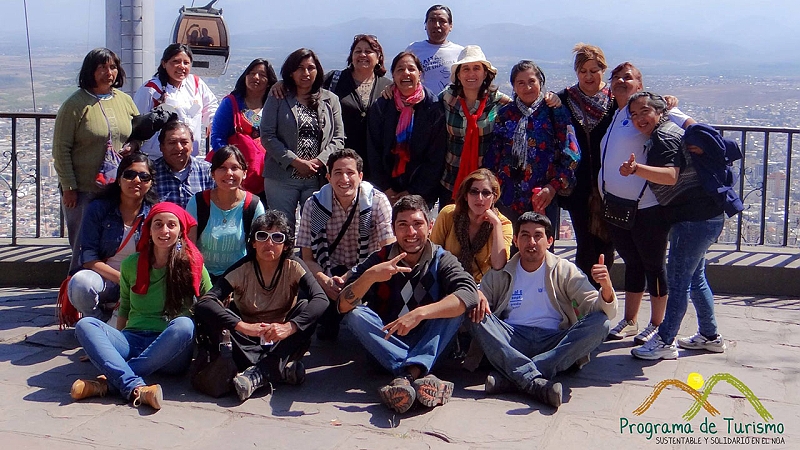
Argentina. Sustainable tourism in rural indigenous communities
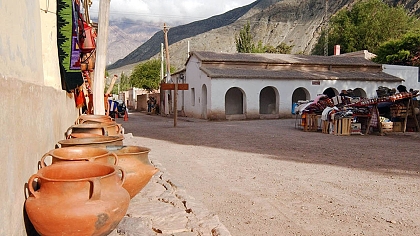 Salta: one of the more beautiful provinces of Argentina, with natural riches and ancient cultures that resisted the Spanish Conquest over 500 years ago. With the arrival of the new millennium it has been upgraded as a destination for tourists and the undisputed centre of the Northwest Region of Argentina. “The Sustainable Tourism Programme was begun in 2010 upon encouragement from the Bishops Commission for Migration and Tourism,” Paula González explains. “The Northwest of Argentina is mainly inhabited by descendants of indigenous peoples. Some live in communities and others are farmers. It demonstrates their connection to the land, both for produce and for artisanal crafts.” The important migrant waves, from Europe, the Middle East and Latin America – especially Bolivia – have created a ‘coexistence of cultures’, with a strong indigenous component that makes this a very unique region with cultural challenges.” The programme was begun in response to the lack of jobs. Only 39% of the economically active population had jobs. “We proposed working in the rural and more remote areas that were most affected,” explains the coordinator. The geography of the region contains wide valleys and rocky highlands (up to above 3000 metres). “We realized that the problem was due mainly to isolation,” continues Paula González, “which prevents them from selling their products, and in some communities there was a lack of water and energy. Those most affected were women and young people.” At that time Argentina was setting up a national tourism development plan that excluded rural communities. Then, the Catholic Church pointed to the need for more equitable and inclusive proposals. The goal was to create new tourist destinations based on agricultural and handicraft production, which are the basis of their livelihood.
Salta: one of the more beautiful provinces of Argentina, with natural riches and ancient cultures that resisted the Spanish Conquest over 500 years ago. With the arrival of the new millennium it has been upgraded as a destination for tourists and the undisputed centre of the Northwest Region of Argentina. “The Sustainable Tourism Programme was begun in 2010 upon encouragement from the Bishops Commission for Migration and Tourism,” Paula González explains. “The Northwest of Argentina is mainly inhabited by descendants of indigenous peoples. Some live in communities and others are farmers. It demonstrates their connection to the land, both for produce and for artisanal crafts.” The important migrant waves, from Europe, the Middle East and Latin America – especially Bolivia – have created a ‘coexistence of cultures’, with a strong indigenous component that makes this a very unique region with cultural challenges.” The programme was begun in response to the lack of jobs. Only 39% of the economically active population had jobs. “We proposed working in the rural and more remote areas that were most affected,” explains the coordinator. The geography of the region contains wide valleys and rocky highlands (up to above 3000 metres). “We realized that the problem was due mainly to isolation,” continues Paula González, “which prevents them from selling their products, and in some communities there was a lack of water and energy. Those most affected were women and young people.” At that time Argentina was setting up a national tourism development plan that excluded rural communities. Then, the Catholic Church pointed to the need for more equitable and inclusive proposals. The goal was to create new tourist destinations based on agricultural and handicraft production, which are the basis of their livelihood.  “The first year, we identified 30 communities and 7 key areas for development in 5 Provinces. Currently, almost 6 years later we are working in 5 areas. There are around fifty entrepreneurs linked to the ‘Network of Tourism Entrepreneurs (NOA)’. If we were to highlight anything it would be the network of organisations that have joined forces to work together in a structured way – national, provincial and local. They include universities, NGOs and businesses. They have also been closely connected to the Economy of Communion and the Movement for Unity in Politics that are key allies. Over these years,” Paula concludes, “what gave strength and effectiveness to the development of the project was the work done on the links in the chain of values and relationships that were formed between all the people involved.” We have already come a long way. There are local projects, new leaders capable of carrying things forward, and we can already foresee very satisfactory results: for example, interaction and mutual cooperation amongst different communities that are stepping out of their anonymity and becoming generators of their own history. For more information: Website Video
“The first year, we identified 30 communities and 7 key areas for development in 5 Provinces. Currently, almost 6 years later we are working in 5 areas. There are around fifty entrepreneurs linked to the ‘Network of Tourism Entrepreneurs (NOA)’. If we were to highlight anything it would be the network of organisations that have joined forces to work together in a structured way – national, provincial and local. They include universities, NGOs and businesses. They have also been closely connected to the Economy of Communion and the Movement for Unity in Politics that are key allies. Over these years,” Paula concludes, “what gave strength and effectiveness to the development of the project was the work done on the links in the chain of values and relationships that were formed between all the people involved.” We have already come a long way. There are local projects, new leaders capable of carrying things forward, and we can already foresee very satisfactory results: for example, interaction and mutual cooperation amongst different communities that are stepping out of their anonymity and becoming generators of their own history. For more information: Website Video
Brazil. What can I do for my people?
Portugal: “High resolution – Rule of fire for peace.”
Promoted by the Youth for a United World, “High resolution – Rule of fire for Peace” will be a dedicated peace day. This event began in Portugal in 2002, and since then has been held on 1 May biannually. It has always involved thousands of Portuguese youths, and also those of various nationalities. In 2016, “high resolution” invites the youth to become protagonists of fraternity and builders of peace without compromises. Through music, choreographies, testimonials and Expo events, they will present the actions that have been launched, with the aim of furnishing concrete answers and giving suggestions on how to proceed in this direction. This year, the programme will also include various workshops that will discuss the theme of peace in various fields such as ecology, art, intercultural dialogue, economy, sports, communication, science and technology. This day is part of the international United World Project that targets universal brotherhood as the paradigm of human relationships, promoting the identification, preparation and dissemination of actions that have already started at global level, in favour of fraternity. Invitation for 1 May 2016

